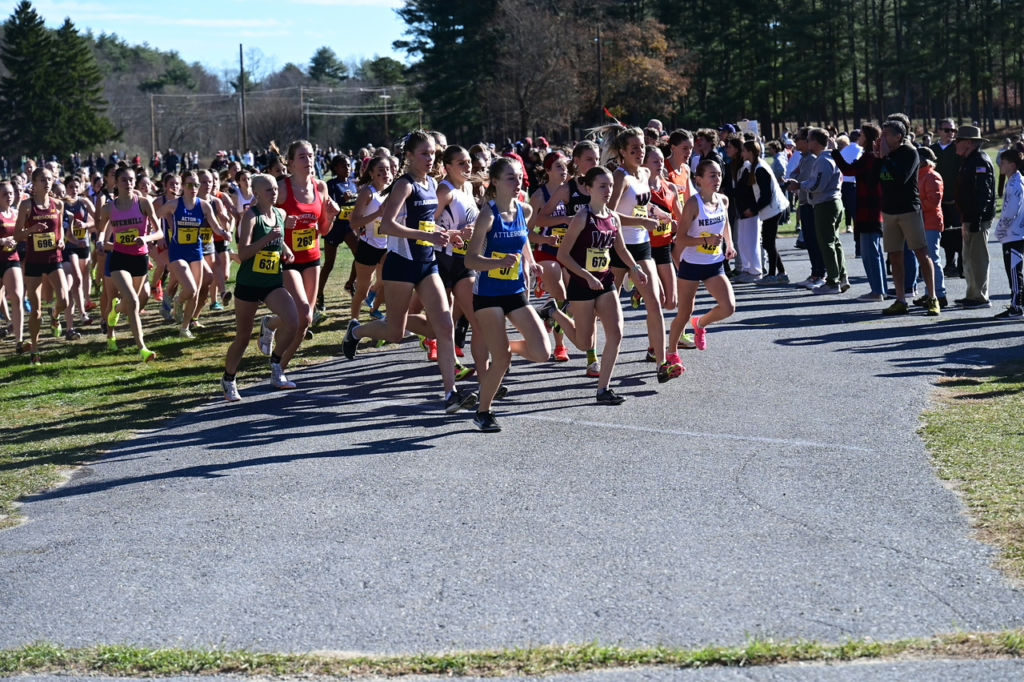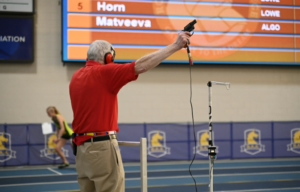Why XC and Track Are the Best (and Maybe Only Really Good) High School Sports
By Mike Miller, BSR Contributor
Sorry for the catchy headline, but now that I have your attention, choir, here comes the sermon.
Full disclosure… I am a 25 year high school coach and history teacher, so I apologize if my perspective is slanted towards my own bias. That being said, I actually DO believe that athletics is intended to be educational in nature, and the national trend of high school sports as a funnel toward professional careers is troubling, and I would argue in many cases, dangerous. Parents are sold a lie that the only way for their child to succeed in athletics is to leave their high school team, join a club program, or perhaps even leave the school altogether, and focus solely on their sport. In spite of the miniscule chances of playing a sport professionally or even at the collegiate scholarship level (especially with an international focus on recruiting increasing), club directors and coaches continue to sell this grift, and families continue to fall for it. NIL deals and unlimited transfer rules have only made the college athletics experience more cutthroat, as agents can now prey on these athletes as young as 14-15 years old.
So, could this happen to high school runners? Of course. Does it? Sometimes, yes. But compared to every other sport, our kids are staying, and having the true high school athletics experience. And this is just one of the top five reasons why Cross Country and Track & Field are the BEST sports a high school kid can play:
- Sticking Around- For the most part, we are fortunate in that the vast majority of athletes in our sport, even the elite ones, are training with, and competing for, their high school teams. There are surely exceptions, but take a trip through the Boston Globe All Scholastic page next month. The senior cross runners will nearly all be headed to Division I schools (with the exception of some kids who choose NESCAC schools for an academic-first approach). Now, do the same exercise for soccer, basketball, hockey, and others, and you’ll find a lot more DII and DIII athletes represented. Why? Because those DI kids are competing for clubs or headed off to private boarding schools to chase the scholarship. Look, it doesn’t always blow up in their faces, obviously. I got to know Charlie Coyle at Weymouth when he was here, and his move to juniors probably earned him his NHL draft spot. But for every Charlie, there’s 1000 Happy Gilmore’s who have 364 days to go until hockey tryouts.
- The Watch Doesn’t Lie- this, for me, is the best thing about XC and track. Almost every athlete in almost every other sport has some idea about how talented they are, and it’s almost always at least a little bit wrong. This isn’t a knock on those players, but it’s just such a subjective exercise, it’s hard to gauge where they really lie. For that reason, recruiting becomes cutthroat, and competition among peers can be brutal. How often do we see soccer or hockey players a) complain about playing time, b) complain to mom and dad, who cement these feelings, and c) take them out on the players who are playing ahead of them? I know lots of great coaches who have tryout rubrics and keep as much objective data as they can to determine who they cut, but at the end of the day, the decision is at least somewhat biased. In our sports, it’s a watch or a measuring tape, and as long as the official on the other end of it is competent (which is USUALLY the case) they simply don’t lie. We talk in education about SMART goals, and the M stands for “measurable,” something that can’t really be done in many sports. The track, the course, or the event can’t vary very much (except those damned sand levels), so tracking progress is so easy. Plus, we have no playing time issues. In track, the slower you are, the more playing time you get!
- Parents are Fans, not Foes- XC and track parents are typically the best parents in sport. Frankly, the way parents of other athletes act these days, this isn’t that tall of a task. It usually sounds like this: “I didn’t sit in a rink/field/gym since he was 5 to watch him sit on the bench so these losers can play over him”. OK, maybe that’s a bit extreme, but tell me it’s not at least a little true. Track parents can’t really make that argument. First, the majority of track and field athletes started in high school, maybe middle school, so there isn’t this entitlement of legacy that other sports carry. Just compare “senior nights”. XC and track events are brief, athlete-centered, and never take away from the, wait for it, COMPETITION to follow. Other sport senior nights are drawn out, parent-centered, and often leave players emotionally spent before the ball is tipped. Second, everybody has some role, and every parent gets to see their kid do something. I’ve never understood why a high school athlete would sit on a bench 20 times a year when there’s a perfectly good XC team waiting for them. Whenever we get a kid that was cut or just stopped playing her other sport, the most common thing I hear from parents is “I wish she switched over years ago”! Lastly, most parents aren’t “experts” on running sports. There’s no worse dad than “I watch the Pats and play Madden, so I have a few plays you should try on Friday night” and no worse mom than “I coach youth soccer, so I have a formation you should play”. Running moms and dads usually understand how hard running is, and if their kid isn’t having success, they can typically empathize with them, rather than blame the coach. And if they do, see #2 and show them the stopwatch.
- Teammates are Sacred- Nothing makes me angrier than when somebody accuses me of coaching an “individual” sport. Everyone knows that XC is a team sport, unless you literally don’t have a team. But, let’s assume if you’re reading this, you do. Unless you actually run track and XC, you can’t possibly know how valuable your teammates are in a workout, a race, or on a long run. Fact is, in an era where anxiety and depression are at an all time high, having others to lean on and who lean on you is invaluable. A good team in any sport delivers on this, and we’ll see it represented in MIAA tournaments over the next few weeks. My friend is the boys soccer coach at my school and he is a wizard at having the conversation with his players about expectations and roles on the team. At the start of the season, he clearly lays out what each player’s role is likely to be, and allows them the chance to move on if it’s not what they envision. I implore all coaches with playing time issues to do the following exercise: ask each player to write on an index card how many minutes per game they should play. Collect the cards, and do some math. There are, for example, 5 spots on a basketball court and 32 minutes in a game, or 80 minutes in a soccer game and 11 players, so there are 160, or 880, minutes, and on and on. I bet the sum of the numbers on those cards far exceeds those totals. So, even in “team” sports, there’s competition among teammates for every minute of PT. Now, one would correctly argue that XC kids and track kids are competing to make the top 7, or for one of 4 spots in a relay, and that’s true. But they have the whole season to settle that, and the competition is usually friendly and brings the best out of them. And the competition happens DURING competitions, which draws teammates even closer. Also, there’s that whole stopwatch thing, which makes it unlikely that teammates could hold any grudges when things don’t go their way. Finally, teammates are particularly important for when races and workouts become difficult, which leads us to our final reason…
- Do Hard Things- The last, and arguably most important reason why this is the best sport, is that it’s arguably the hardest (I’ll accept wrestling as the only other right answer). Run repeat 1K’s on a Saturday morning in the winter in a rainstorm or tie a sled to your back and do hill sprints, and argue with me then. Sport, dating all the way back to Ancient Greece, is intended to build character, and no sport builds character quite like running. Years ago, I was a groomsman for a friend of mine, and at his rehearsal dinner, I met his father-in-law to be, who was a successful businessman and owned his own company. He asked me what I did, and when I told him I coached XC and track, his eyes lit up. He said “make sure you go to practice tomorrow and tell your kids this: if ANYONE applies for a job at my company out of college with cross country or wrestling on their resume, they are automatically given an interview”. When I asked him why, he responded that, by and large, these are team players, people who have discipline, commitment, and can go through challenges. In a world where far too few “Gen Z’ers” or “Gen Alphas” are work ready out of high school or college, having the discipline of a runner makes you a unicorn. I’m not suggesting that other athletes aren’t great people, many are. But, today, effort, attitude, and preparation are attributes we take for granted, and runners tend to have these in spades.












3 Responses
Great article, thanks. I think an article can also be written the exact same about now youth xc/track clubs are also the best youth sport clubs. 99% of them don’t have cuts, encourage school team participation (and celebrate it), opportunities are based on the clock, participation is economically affordable (more so than my towns HS team!), and everything else you wrote. Of course there are the one or two for-profit running clubs out there whose value proposition I don’t understand (but parents are free to spend their time/money as they like).
I agree, but those few clubs for profit (mega profit) are muddying the waters by having kids miss HS practices (or overtrain if not) for their workouts. It’s a shame to see it heading in that direction. Running really is a sport that needs focused in season coaching.
I don’t see the mega profit club developing runners any better than a public high school with a dedicated coach. Is the club developing runners at a greater rate than any school with a similar roster size? (No). The racing opportunities aren’t any better – and are certainly worse if you are skipping out on the great HS competition in MIAA. They aren’t getting into any meets an athlete at the same level can’t just enter themselves. I don’t get the appeal other than the ego boost of being part of an “elite club team”. it feels almost like a ponzi scheme – sell the club to as many already high performing athletes as possible, to use as advertising to sell to even more athletes the following season. 1 athlete overtraining/underperforming/quitting doesn’t matter if promoting them as being on your squad helps bring in 2 faster kids the next season. Trackflation keeps the ponzi scheme rolling. And let’s be honest, it doesn’t take a 1 in a million running expert to develop a high school distance runner who wants to improve. There aren’t magic workouts that make kids “elite”. This isnt a highly specialized skill that requires hard-to-access training facilities like polo (or pole vault). Consistently train the basics and sustainably grow the workload. It’s why MIAA is far more competitive than NEPSTA in track/cross country and will continue to be.